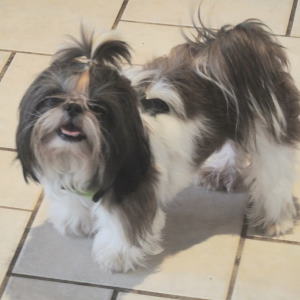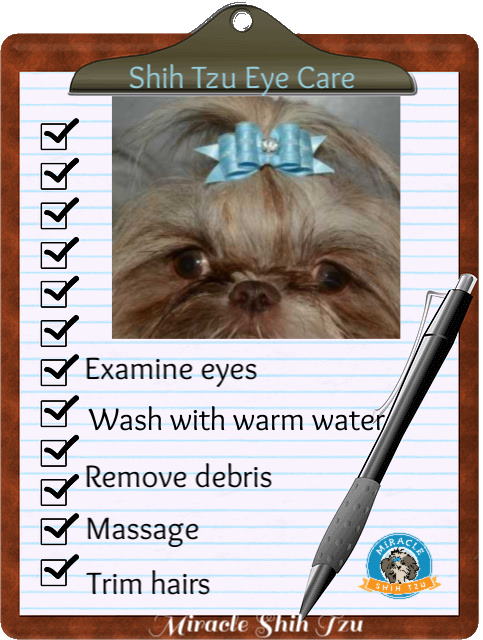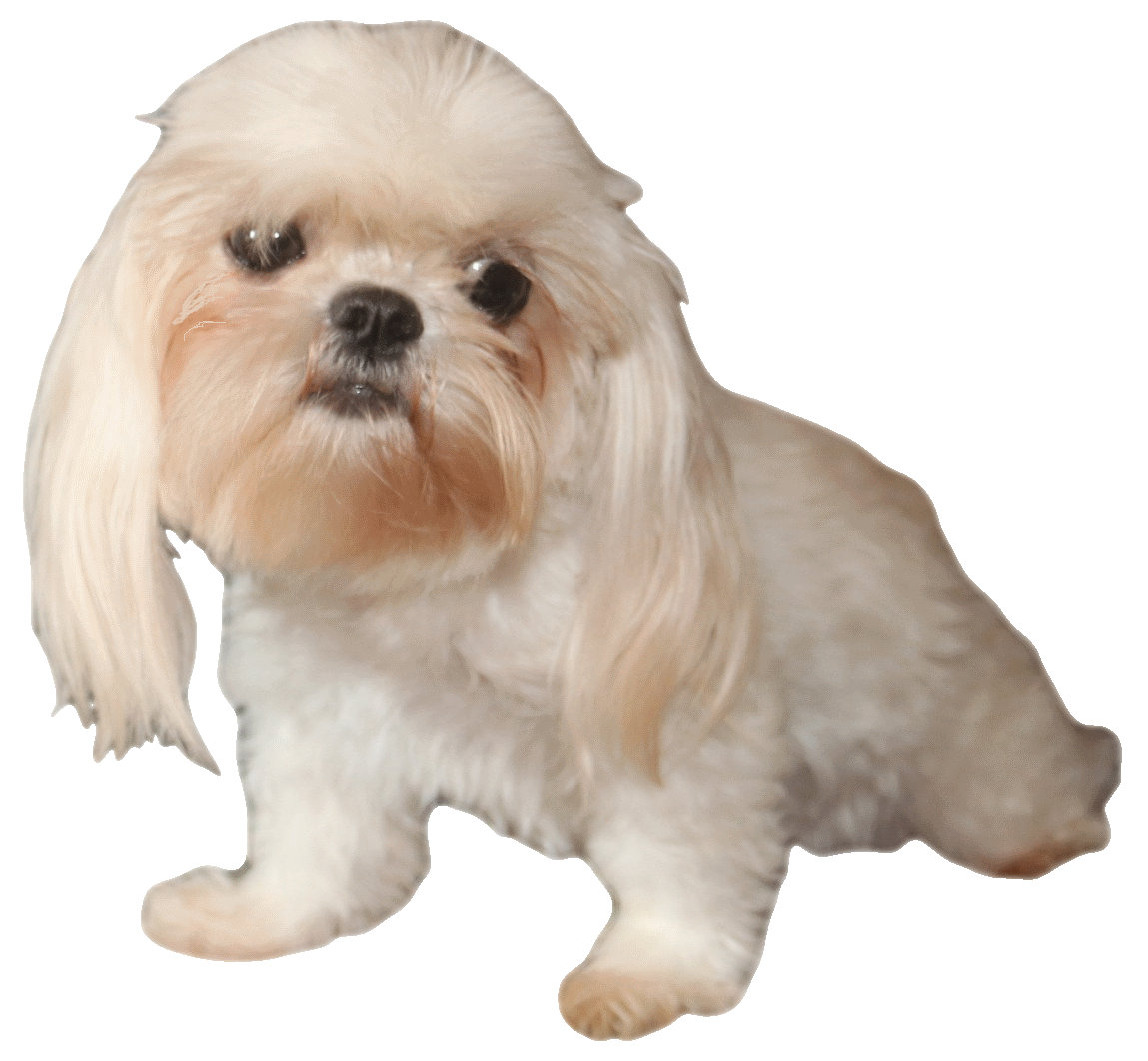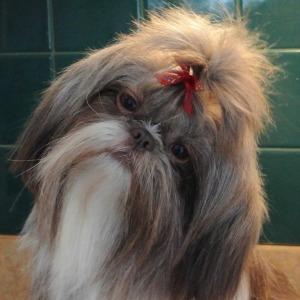Daily Shih Tzu Eye Care
Shih Tzu Eye Care by Janice Jones |Published 04-07-2020
It seems unusual to place eye care under the category of grooming, but in some ways it makes sense. Eye care can be a separate category all together, but placing them within a grooming routine can make a great deal of sense. A routine grooming schedule that includes eye care will make sure that eyes are never excluded from your attention. And, that is so important because eye care is vital to the heath of your dog.



Shih Tzu eyes should be bright without visible debris and the standard calls for eye whites to be at a minimum. Most Shih Tzu eyes are brown but can also be green or blue. Regardless of eye color, placement on the face, or hair style, Shih Tzu eye care will be the same.
Routine Shih Tzu Eye Care
Eye care is especially important for certain small breed dogs, especially those brachycephalic breeds where eyes are prominent and vulnerable for injury. Eyes in long haired breeds are also at risk because hair continues to grow over and around eyes making them prone to injury just based on the hairs that continue to grow around the eyes. Excessive discharge around the eyes is often the first symptom that causes a dog parent to be concerned. But what causes eye discharge in dogs?
Common Causes of Eye Discharge in Dogs
External Irritants to the Eyes
When you begin to see a clear eye discharge, there are good chances that allergies or something that is irritating your dog’s eyes such as dust, or a foreign body has entered your dog’s eyes. A foreign object could be as simple as an eyelash or hair that is irritating the eye. Trauma is another issue that can happen very quickly and lead to devastating outcomes such as the loss of an eye.
Conjunctivitis
Just like people, dogs can get pink eye or conjunctivitis. Basically, this is an inflammation of the conjunctiva, the tissue that covers the front part of the eye and lines the eyelids. Brachycephalic breeds that have short noses are more at risk for developing this problem. Conjunctivitis causes a yellowish-green puss to develop due to allergies, injuries, birth defects or tear duct problems, dry eye or even tumors.
To treat conjunctivitis, it's important to learn what's causing it. Depending on the cause, treatment can include: removing the irritant and soothing the area with pain medication; antibiotics and saline washes to manage infection; surgery to treat duct problems or birth defects; antihistamines for allergies; or other medications.
Epiphora (excessive tearing).
Watery, teary eyes -- resulting in stained or smelly fur and/or infected skin -- can also be the result of many conditions, including abnormal eyelashes, inflammation, allergies, corneal ulcers and blocked tear ducts. This condition is extremely common in the Shih Tzu breed.
Blocked Tear Ducts
When there is an anatomical problem, blocked tear ducts may be to blame. Tears will drain down the face rather than back onto the eye and lubricating the eye as these should. These blocked, tear ducts will need the attention of a veterinarian. In other cases, there are problems with eyelashes irritating the eye, and growing in the wrong direction.
Any irritation whether it is environmentally induced such as dust or pollens on the eye, or genetic abnormalities require the expert help of a veterinarian. If you have ruled out any probably cause, the next step is to set up a daily checklist to keep those eyes as clean as possible.
Shih Tzu dogs are both a long haired breed as well as considered a brachycephalic breed. Eye problems can occur very quickly and deprive your dog of sight if not treated quickly.
Daily Shih Tzu Eye Care
If you can get into the habit of cleaning your dog’s eyes on a daily basis, you will be much more successful in eliminating a variety of problems.
- Reduced tear staining that causes unsightly stains on light colored dogs
- Identification of eye concerns that if caught early can be treated preventing chronic eye problems and loss of vision
- Prevent eye pain in your dog by identifying problems and providing first-aid and the necessary medication to alleviate pain.
- Save money in the long run by treating minor issues before they become major problems requiring expensive surgery.
Each dog is different, so finding a daily routine that fits each and every dog may not be practical. Some Shih Tzu dogs are kept in long coats where face hair is extremely long but controlled. Others are groomed bi-monthly and hair is clipped around the face, eyes, and head to prevent hairs from irritating the cornea. Whatever situation you find yourself in, there are a few simple steps you can take to assure your dog ‘s eyes are well cared for.
Shih Tzu Eye Care - The Daily Eye Checklist
 A checklist always helps us remember what we need to do daily for our Shih Tzu eye care.
A checklist always helps us remember what we need to do daily for our Shih Tzu eye care.First, you don’t need to have a professionally ophthalmologist or even a magnifying glass to check your dog’s eyes. All you need is good lighting and your own vision. Obviously, if you have poor vision yourself, you might want to use a simple magnifying glass to observe for irritations in your Shih Tzu’s Eyes.
Quick Examination and Eye Inspection
The first step for your daily Shih Tzu eye care is a quick examination: Look for irritants, including hairs, dust, or other objects that might be merging close to your dog’s eyes. Look for crusty debris such as dried tears that need to be removed. Observe for moist areas such as mucus that is accumulating under your dog’s eyes.
You will need good lighting but you shouldn’t require any special tools. If your own vision is great, consider a small hand magnifying glass and a pen light. Dogs don’t like having a light shown in their eyes, so if you are not checking for pupil changes, don’t shine the light directly on their eyes.
Do Daily Shih Tzu Eye Care by First Removing Irritants
 Shih Tzu Eye Care may mean trimming a few stray hairs away from the eyes, even if it is not time to visit the groomer.
Shih Tzu Eye Care may mean trimming a few stray hairs away from the eyes, even if it is not time to visit the groomer.All of these irritants will need to be removed.
- Use a cotton ball, tissue, or warm washcloth to wipe over and under the eyes, removing any debris such as mucus, dried crusty tears, or dirt.
- f you are able to remove all debris, then simply take a second cotton ball or tissue and wipe dry. If not, you can use a small comb with fine teeth such as a puppy comb or a flea comb to break apart large clumps of dried tears. Do this very gently, as your Shih Tzu is likely to be very hesitant to allow you to do it tomorrow if they feel any pain.
- A good finger massage over the nose and just under the eyes is usually tolerated well and can remove much debris without having to wash with a cotton ball, or wash cloth
- Once all the debris is removed, examine the eye and surrounding areas. Are their overgrown hairs that need to be trimmed? Eyelashes?
- If you do need to trim a few hairs to prevent them from touching the eye, do so with a pair of small blunt scissors. Do this only if your dog will remain still. Don’t attempt to clip hair around your dog’s eyes, if they refuse to remain still. Save the task for your professional groomer or veterinarian.
Are you trying to grow your Shih Tzu’s coat out to its originally long length? This is not an easy task after a Shih Tzu’s coat has been trimmed, but still doable. To keep stray hairs from touching the eyes once the decision to regrow the coat, use products such as petroleum jelly or grooming aids that will manage the hair until the hair has reached the length that can prevent loose hairs can touch the eye.
Does Your Shih Tzu Suffer from Dry Eye?
Dry Eye or Keratoconjunctivitis sicca (KCS) results when there is an inadequate supply of tears. Any condition that interferes with the body's natural ability to produce tears can cause dry eye.
- Some Immune-mediated diseases can damage the glands that produce tears
- Canine distemper
- Some medications such as sulfa drugs
- Hypothyroidism
- Inner ear infections
You can use over the counter solutions to help your dog with dry eye. But before you begin, please check with your veterinarian to rule out other causes. An eye drop several times a day will keep your dog’s eyes feeling fresh and pain-free by just using an over the counter human remedy.
If this doesn’t work and your Shih Tzu seems stressed, your vet can prescribe other eye ointments that will give your Shih Tzu some relief. How do you know if your dog is stressed out by painful or irritated eyes?
Signs of Irritated Eyes
- Is she pawing at her face?
- Does she rub her face on the carpet or some other surface?
- Does she cry if you try to touch her face near her eyes?
- Does she resist your efforts to get near her eyes?
- Can you see eyelashes that are touching the eye?
- Is the white of her eye noticeably red or bloodshot?
- Can you see anything unusual about the surface of her eye?
If you can answer yes to one or more of these questions, then it’s time to see the vet.
Shih Tzu Eye Care: Does Your Dog Need Goggles?
Does your Shih Tzu need to wear goggles to protect their eyes? Some do, especially those that enjoy walks in the woods or where they may encounter irritants that put them at risk for loosing an eye.
Windy days can be especially hard on eyes. If you live in an area where there are frequent high winds, especially those that pick up dirt and dust, then purchasing a pair of goggles might be the best investment you can make.
Sometimes puppies and adult dogs play very hard and get into scuffles that become a bit more than rough and tumble play. If you are worried your dogs are going to injure each other’s eyes during a vigorous play session, then googles might make sense.
If you regularly take your dog along on runs, bike rides or on a motorcycle, goggles will help make the activity much safer.
Most goggles also provide UV protection and many are water-proof, ideal for wearing on the beach.
Measure your dog and match your dog's measurements to the product sizing guide for best fit.
Final Thoughts About Shih Tzu Eye Care
Protecting and caring for your Shih Tzu’s eyes might be one of the best gifts you can give your dog. Naturally, blind dogs can manage and live long lives, but why risk it when you can invest only a few minutes each day to care for their eyes.
"Hi, I'm Janice Jones, a former veterinary technician and Shih Tzu expert with over 40 years of experience with the breed. Through Miracle Shih Tzu, I combine my medical background and extensive breed knowledge to provide reliable, practical advice for Shih Tzu owners. My mission is to help you give your Shih Tzu the happiest, healthiest life possible through evidence-based information and real-world solutions. Whether you're new to the breed or a seasoned owner, you'll find trusted guidance here for all aspects of Shih Tzu care.
I hold an undergraduate degree in Psychology with a minor in biology, Early Childhood Education, and Nursing, and a Master's in Mental Health Counseling.







